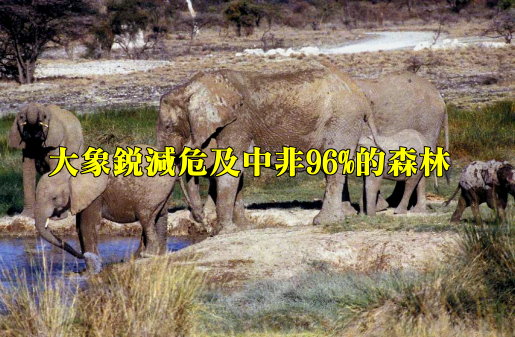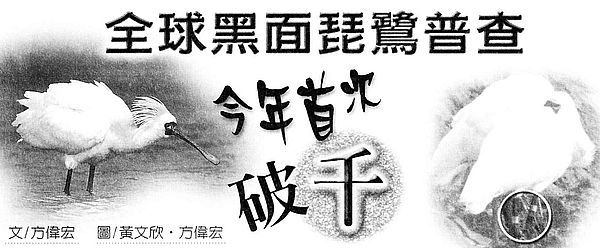
森林中每個物種都有其天職,在生態系經營與演化過程裡都扮演著重要角色,森林裡沒有主角配角之分,沒有責任輕重,只有分工。非洲象是陸地上最大型的哺乳動物,藉著牠的吃與拉,在非洲森林生態系就有著重要的功能,牠的消失,會連帶造成森林的萎縮。美國杜克大學最新研究指出:大象銳減會危及非洲中部96%的森林,我將該新聞翻譯成中文,請參閱。
大象銳減危及非洲中部96%的森林
美國杜克大學研究指出,2001年以來,因為盜獵猖獗與棲地破壞,非洲中部的大象數量已銳減了63%,連帶地也引發區域內森林退化的危機。
「如果不制止盜獵,隨著象群數量減少,而存活象群則擠在狹小的森林,將嚴重改變非洲中部96%的森林樹種的組成與結構。」 杜克尼可拉斯環境學院熱帶生態學副教授約翰保羅森說。
約翰保羅森說明,大象是「生態工程師」, 透過散播種子、循環並傳布養分,以及清理林下植被,可以創造與維護森林棲地。
他指出,因為大象是大型動物,可以吃下其他動物無法吃的大顆水果並散播其他動物不能消化的種子,加之大象移動性強,可以透過糞便將種子傳得更遠更廣。
如果大象消失, 許多樹種的種子將無法遠距離傳播,樹木種子只能靠小型動物傳布,這將明顯的改變了森林的樹種成分,進而影響了森林的結構與擴展。
大象數量愈少,也意味著牠們糞便中的養分將更為侷限地傳遞。
非洲中部許多森林的氮素非常有限,而大象在大地移動時排便,可以補充森林的營養尤其是氮肥。如果大象數量持續下降,氮肥將更集中在愈來愈小的區塊,也將更侷限樹木在其他地方的生長,保羅森說。
林下植被密度也會因大象的存在而有所改變,保羅森指出,大象對森林生態有極大影響力,牠們會吃掉或踩踏生長緩慢的植物,使得林下空間較為開闊,讓更多陽光照進森林,並且減少樹木之間對水與養分的競爭,有的受益有的受害,於是會有不同的強勢樹種產生。
他與同事在3月1日出版的《保育生物學》期刊上共同發表了這篇論文。
ELEPHANT DECLINES IMPERIL 96 PERCENT OF CENTRAL AFRICA’S FORESTS
DURHAM, N.C. – Poaching and habitat loss have reduced forest elephant populations in Central Africa by 63 percent since 2001. This widespread killing poses dire consequences not only for the species itself but also for the region’s forests, a new Duke University study finds.
“Without intervention to stop poaching, as much as 96 percent of Central Africa’s forests will undergo major changes in tree-species composition and structure as local populations of elephants are extirpated and surviving populations are crowded into ever-smaller forest remnants,” said John Poulsen, assistant professor of tropical ecology at Duke’s Nicholas School of the Environment.
These changes will occur because elephants are ecological engineers that help create and maintain forest habitat by dispersing seeds, recycling and spreading nutrients, and clearing understories, Poulsen explained.
“Because they are very large animals, they can eat fruits and disperse seeds too big for other animals to digest. And because they are highly mobile, they help disperse these seeds far and wide through their dung,” he said.
In the elephants’ absence, scores of tree species may be left without a means of long-distance seed dispersal, which is essential for forest structure and colonization. Trees whose seeds are dispersed by smaller animals could fill the void, dramatically altering forest composition.
Fewer elephants will also mean a more limited distribution of the nutrients contained in their dung.
“Many of Central Africa’s forests are nitrogen limited. Elephants help compensate by moving nutrients, especially nitrogen, across the landscape as they defecate. If populations continue to shrink, this nitrogen will be concentrated in smaller and smaller areas, limiting future tree growth elsewhere,” Poulsen said.
Understory density will also be affected.
“Elephants have a large effect on forests by eating or trampling slow-growing plants and opening the understory, allowing more light in and reducing competition for water and nutrients,” Poulsen said. “These changes alter the recruitment regimes of tree species — favoring some and not others.”
He and his colleagues published their peer-reviewed study March 1 in the journal Conservation Biology.
延伸閱讀:
本網誌「生態保育」專欄各文








不敢不敢,您也一樣時常撰文大聲疾呼,帶動社會思考與改善,我們一起努力。
賴總實在是個身體力行讓人感佩的環境前輩
雖然不曾也不會購買象牙製品,但吾等少數人的體會,怕是撼不動盜獵者的心態與惡行!
非常有意義的研究,非常感謝你的分享
大家不要買象牙製品,沒有買賣就沒有屠殺。
盜獵行為應予有效制止!
這個文獻很有意思,我在非洲有位經營Safari的朋友,他提過由於大象會啃樹皮,造成許多樹木死亡,因此需要非常廣大的區域才能容納少數象群,和文獻的角度剛好相反了。
文中提到的森林和史瓦濟蘭、南非的森林似乎不太一樣,南部非洲的比較乾燥、樹木矮小,旱季的時候全部枯死,這種時候樹皮再被大象一啃必死無疑,Safari的時候只要看到有一區樹木死亡傾倒,必定是大象的傑作無疑。
或者中非的森林資源太充足,大象不需要啃樹皮?
若有機會問我朋友,我再補充南非這邊的觀點。
謝謝您的分享:-)
厄,如果說是維持生態系當前的穩定狀態的話,一個生態系內的不同生物,還真的會有影響大小之別,某些物種對整體非常重要(例如賽倫蓋堤的牛羚),有些物種沒那麼大
短視近利絕不會看到災難降臨!